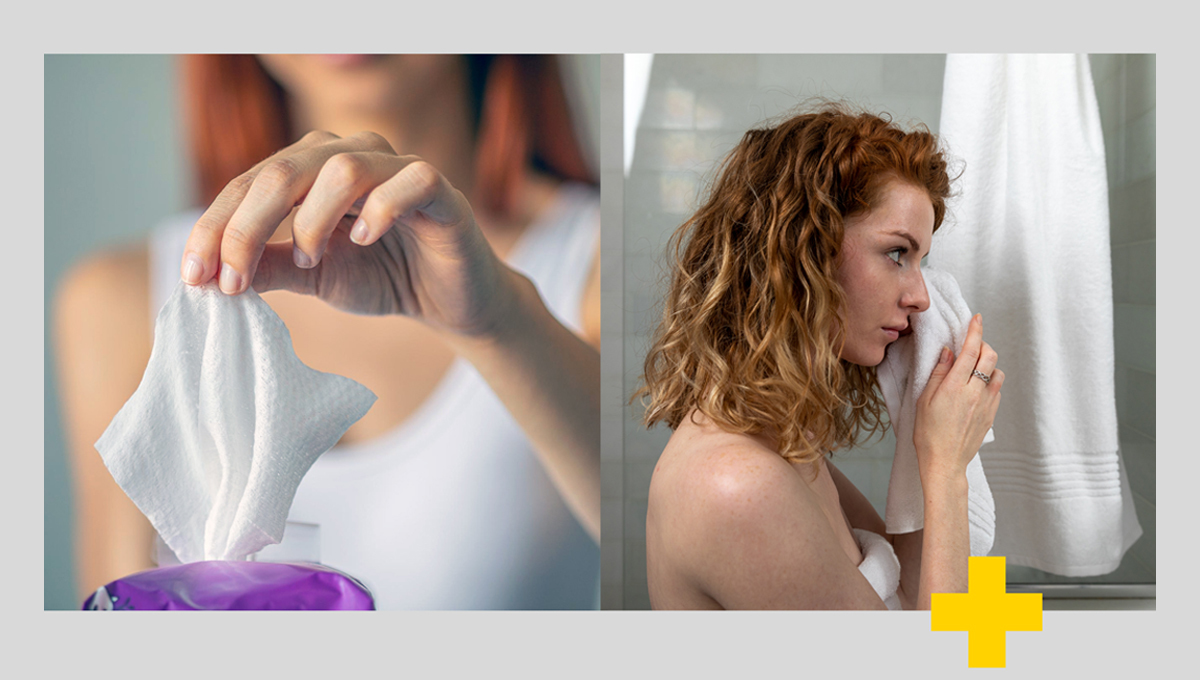.jpg)


With all the recent coveragei about wet wipes containing plastic to be banned - we thought we would delve into the world of single-use plastic wet wipes and their impact on the environment and your skin.
Types of plastic wet wipes
Let’s start with the basics – what are wet wipes? Quite simply they are disposal pre-moistened towelettes that are lightweight, versatile, travel friendly and super convenient. They are used for cleaning or hygienic purposes, and can be individually wrapped or in a multipack. You can find them in quite a few different iterations such as baby wipes, antibacterial wipes, facial/beauty wipes, kitchen/cleaning wipes, and more.
Wipes can vary by the material used for the non-woven fabric and the cleansing solution that is used. The non-woven wipe fabric can be made from several different materials including bamboo, rayon or plastic. The cleansing solution also varies by brand and purpose. In addition, a fragrance or moisturising agents can also be added to wipes.
What is the problem with plastic wet wipes?
While wipes might be the quickest and cheapest way to clean they are not the best option for the environment. This is because wipes often contain a mix of plastic fibres such as polyester and polypropylene which prevent them from biodegrading. For example, the Marine Conservation Society claim that a large proportion of 11 billion wet wipes used in the UK every year still contain some form of plastic and these can take up to 100 years to biodegrade.
- Single-Use Disposal: the single use nature of wet wipes means that they are thrown away after being used just once. Baby wipes, cosmetic wipes, bathroom cleaning wipes and moist toilet tissues are not recyclable and are essentially non flushable. According to Water UK, wet wipes cause around 75% of drain blockages.iii Wet wipes are also a major component of ‘fatbergs’ that block sewage systems
- Microplastic Pollutioniv: wet wipes are commonly made from non-biodegradable materials such as polyester and plastic fibres. These break down into microplastics. It is then these microplastics which are then be ingested by wildlife and enter the food chain and water supply, which are harmful to human health and ecosystems
- Chemical Pollution: wipes often contain a variety of chemicals, including preservatives, fragrances and cleaning agents. These chemicals can leach into the environment and potentially harm wildlife and ecosystems.
Beyond the environmental impacts wipes can also have a negative impact on your skin, particularly those used on your face and body such as baby and beauty wipes:
- May not fully cleanse your skin: wipes may just redistribute dirt and makeup around your face, without fully removing or rinsing them away
- Skin irritation: fragrances and other preservative ingredients added to wipes can remain on your skin causing irritation. This could also lead to clogged pores and breakouts. The extended use of facial/beauty wipes can also cause dehydration in the skin as they remove natural oils
The UK Government
In April 2024, the UK government announced plans to introduce legislation banning the sale of wipes containing plastic. This new law is expected to come into effect in England before July, before then being rolled out across the rest of the UK. The goal of the new legislation is to find more environmentally-friendly alternatives to microplastics.
What are the alternatives?
There are a number of plastic free wet wipes on the market which are made from cotton or biodegradable, plant-based and decomposable materials. However, plastic-free alternatives may not necessarily be the solution. While plastic-free alternatives do not introduce microplastics into the environment, they can still cause blockages in the sewerage system.
Why not try alternatives to single use disposable items such as wipes? A cloth, whether it be a fabric face cloth, flannel, tea towel or something similar, can be used in place of single use wipes. These items can be washed and reused. Not only are these better for the environment but can also offer cost savings too.
Plastic Free July
Did you know that you can join in the Plastic Free movement this July and be part of Plastic Free July by choosing to refuse single use plastics. Find out more about it here.
Plastic Free July provides resources and ideas to help you (and millions of others around the world) reduce single-use plastic waste everyday at home, work, school, and even at your local cafe. Are you ready to take the challenge?
For more information, please contact us at:
SilverGuard Ltd
t: 0207 538 2678
SilverGuard is a UK-based company which produces an antimicrobial textile range using Noble Biomaterials renowned IONIC+ antimicrobial silver thread technology. Our current consumer product range includes bed linens, towels, baby & children’s clothing, face coverings and more.
i see for example: www.gov.uk/government/news/uk-wide-ban-on-wet-wipes-containing-plastic-to-be-put-into-law; https://news.sky.com/story/wet-wipes-containing-plastic-to-be-banned-from-sale-in-uk-13120426
ii Marine Conservation Society, www.mcsuk.org/news/our-seas-are-swimming-in-wet-wipes-its-time-to-take-action/
iii Water UK, www.water.org.uk/news-views-publications/news/public-urged-bin-harmful-wet-wipes-over-fifth-admit-flushing-down
iv Microplastics are small plastic pieces less than five millimeters long which can be harmful to our ocean and aquatic life
Related Products
.jpg)





